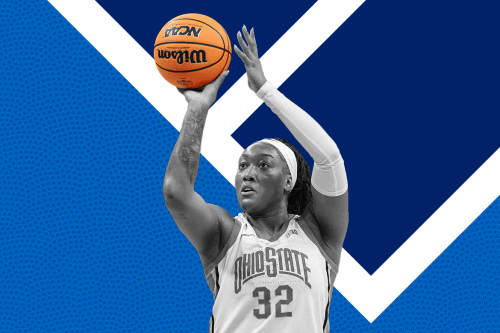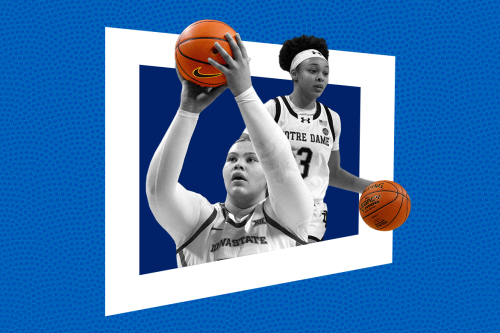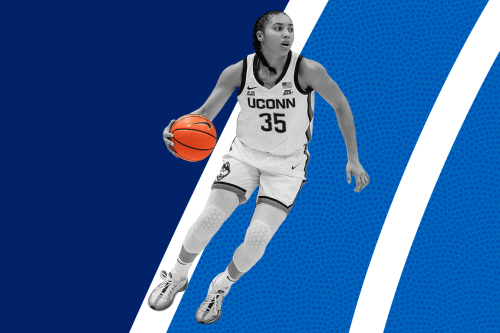I Am a Fourth-Generation Runner—Here’s What the Sport Means to Me and My Family
One writer speaks about what it has been like to be a fourth generation runner, following in the footsteps of generations before her.
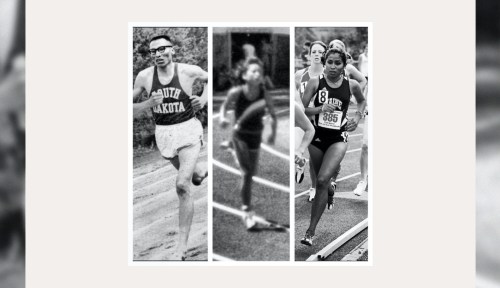
My name is Jordan Marie Brings Three White Horses Daniel. I am Kul Wičasa Lakota and a citizen of the Kul Wičasa Oyaté, the Lower Brule Indian Reservation in central South Dakota on the Missouri River. I am a fourth-generation, Brings Three White Horses runner. My great-grandfather ran. My Lala (grandfather) Nyal Brings ran. My Ina (mother) Terra ran. Every time I run, I run for them. I run for my family. I run for my relatives.
I feel like I was born to run, even if I rejected it at times. My Lala took me on my first run, which ended on an uphill back home. I kept thinking: “How is this fun?!” But I saw the joy it gave him, so I stayed with it. Both my mom and grandfather had dreams to qualify for the Olympic Trials, and now that is my dream too: in the marathon. My Lala Nyal was a mid-distance runner for the University of South Dakota and was inducted into the USD Hall of Fame for his running accomplishments. Lala Nyal competed in the mile a few times with his friendly rival Billy Mills (Oglala Lakota; he adopted my mom and me after my grandfather passed away), with Nyal taking the victory. (Mills later won gold in the 10K at the 1964 Tokyo Olympics.) My grandfather never mentioned this to us until Mills told us at Lala Nyal’s funeral. My mom and I were shocked to hear it—but the unmentioned victory shows the humility that my Lala had. My Ina Terra was a sprinter and my Lala was her coach. They both looked ahead to the 1988 Olympic Trials and planned every race and workout for her to reach that goal; however, her path led her to become an incredible pediatric, dialysis, oncology, and now COVID-19 nurse.
The best thing about running on the trails is that it helps me connect with Unči Maka (Grandmother Earth) and gives me a deeper appreciation of the lands that Native people cared for, which inspires me to keep protecting her for our next generations.
So, it was my Até (dad), who really helped me to develop mental toughness for running and to believe in myself. I went from running as a tradition because of my family, to running for the representation of Native athletes, to loving running for just me, to running intersecting with my passion of advocacy. I mostly focused on the longer distances like the mile, relays, as well as running cross country in high school. Then in college, I really fell in love with running for myself and all that it gave back to me. I started with 5K and 10K races, then moved down to the shorter distances—a mile, 3K races, and relays. After college, I moved back up to longer distances, racing half marathons and eventually marathons, and in the last two years, I have been enjoying trail racing, which reminds me so much of cross country but is indefinitely harder. The best thing about running on the trails is that it helps me connect with Unči Maka (Grandmother Earth) and gives me a deeper appreciation of the lands that Native people cared for, which inspires me to keep protecting her for our next generations.
Gold Medal Couple Tara Davis-Woodhall and Hunter Woodhall Talk Marriage, Motivation, and Their Next Chapter With Nike

Coach Kara Lawson Wants You to ‘Handle Hard Better’—and Here Are 3 Ways to Do Just That
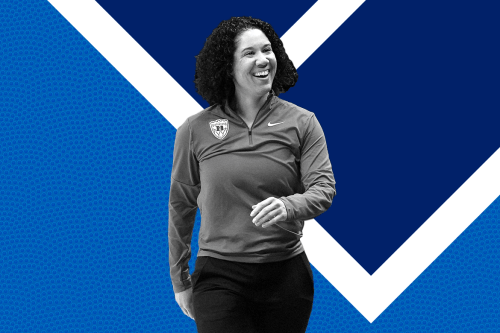
JuJu Watkins Leaves March Madness With ACL Tear—and This Knee Injury Is More Common Than You Think
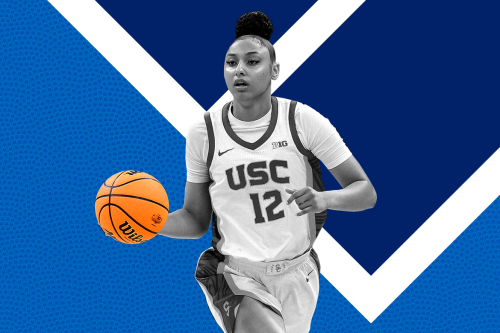
Running has given my life structure and helped to propel me forward, and it has also connected me to a new family, one that supports me as well as the amazing initiatives and fights led by Native organizations. In 2016, I ran my first marathon for the Running Strong for American Indian Youth at the Boston Marathon to help fundraise for their programming. In 2019, I ran the Boston Marathon again, as a chaperone to help raise funds for Wings of America. It was this race, and this moment, that I saw the power of my passions for advocacy and running intersect. I ran in prayer, dedicated 26 miles to 26 Indigenous women and girls, and began #RunningForJustice to help raise awareness to bring an end to this epidemic that impacts Indian Country. I saw the opportunity to share the competitive platform I have with those I care about, with those no longer here anymore, and bring along my relatives and communities.
Yes, I want to run fast, yes I have goals, but at the end of the day, it’s not about a medal, a record, or a fast time.
Being a fourth-generation runner is also about representation. As a Native athlete, I want to let other Native people and people of color know that these spaces can, and should, include us. Recently, I signed my first ever shoe contract with Altra Running as a professional Team Elite runner and became a professional runner with RABBIT Pro. After I signed my contracts, I kept thinking of my Lala Nyal and my Ina Terra, and that this is for our family and for Indian Country. Yes, I want to run fast, yes I have goals, but at the end of the day, it’s not about a medal, a record, or a fast time. It’s about being intentional with my running to impact social change, to run in prayer, and to make space for Indigenous relatives missing and murdered—for Black lives murdered. It’s about justice across all our movements and for all our communities most impacted by white supremacy, racism, and systemic oppression.
With my running, I am trying to create opportunities to call and bring people in. I want to help uplift, center, and provide education for people to know that Native people are still here. We are our own storytellers and we can control the narrative of our past, present, and future. In October, I organized an Indigenous Peoples Day 5K, 10K, and half marathon virtual run for anyone to participate and learn from Native people and to support Native-led heart work. In June, I partnered with Seeding Sovereignty to launch a virtual 5K, “Running for the Health of All Nations” to help raise funds to support our efforts in providing masks, hand sanitizer, anti-bacterial wipes, and supplies to Indigenous communities impacted by COVID19. In November, for Native American and Alaska Native Heritage Month, I organized the Native American and Alaska Native Heritage Month Run and Wellness Challenge. These were such successes and was truly beautiful to see the support that came in.
Soon, I’m launching the Running on Native Lands Initiative through my organization, Rising Hearts, and I have a bonfire campaign that ends on December 24 to help raise funds for Rising Hearts. And next year, I’m organizing the Running on Native Lands virtual 5K, 10K, and half marathon, which will take place from February 1 to 10th, 2021.
So many of us are running with purpose. This year, I finished a 360-mile prayer run from Bears Ears National Monument in Utah to Salt Lake City, UT to raise funds to support SLC Air Protectors and Urban Indian Health Center of Salt Lake and carry and offer prayers for our relatives and communities. This was a powerful prayer run and I learned so much. Eleven Native runners from across Turtle Island (North America) came together to run in prayer. And then, I ran the Truthsgiving 30 miler Prayer Run. Not only is running is medicine but the laugher and joy we felt being together, was another unexpected medicine I felt.
Running is medicine. Running is healing. Running is family. Running is tradition. Running is prayer. And running is advocacy. This is why I run and what motivates me. I’m excited to keep on running.
Sign Up for Our Daily Newsletter
Get all the latest in wellness, trends, food, fitness, beauty, and more delivered right to your inbox.
Got it, you've been added to our email list.
